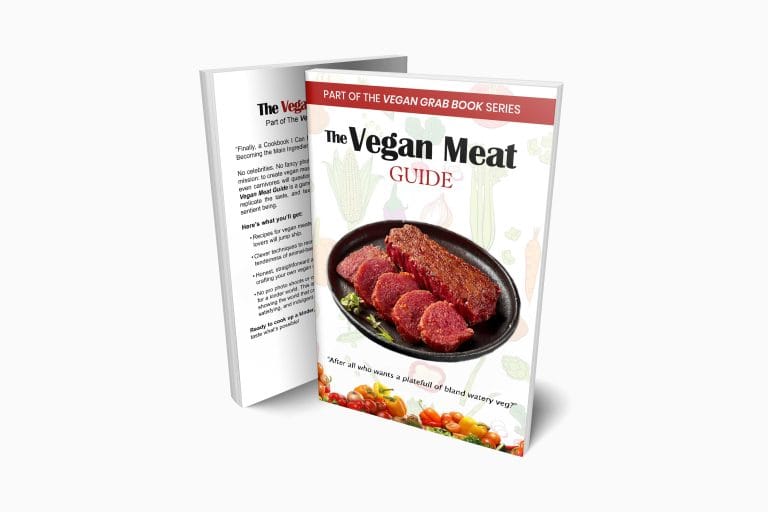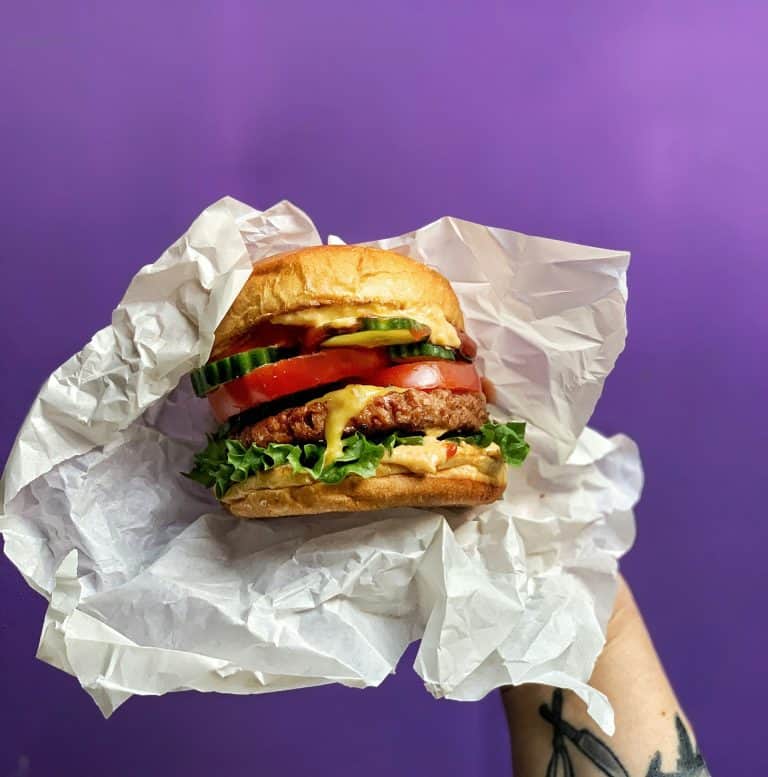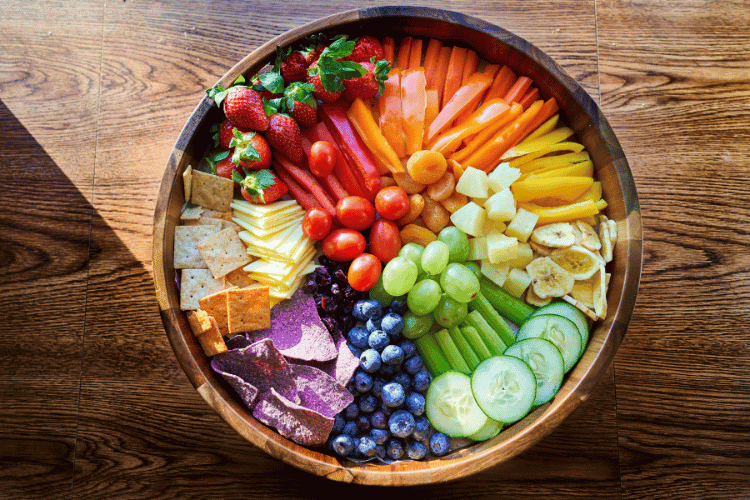What Is Vegan Cheese Made Of
What Is Vegan Cheese Made Of: Is It Any Good?
Vegan cheese is a dairy-free alternative designed to replicate the texture and taste of traditional cheese. It caters to those following a vegan diet, people with lactose intolerance, or individuals looking for plant-based food options.
Made from various plant proteins and fats, vegan cheeses aim to offer a similar culinary experience without any animal products. Ingredients commonly found in vegan cheese include nuts, vegetable oils, soy, and various natural thickeners and flavourings; these allow for the mimicking of cheese’s creamy texture and meltability.
The appeal of vegan cheese has grown, coinciding with a surge in plant-based diets and increased awareness around food allergies and ethical consumption. To cater to a diverse palate and dietary requirements, vegan cheeses come in various styles, including shreds, slices, and blocks, resembling mozzarella, cheddar, and even artisanal cheeses.
Their nutritional profiles vary depending on the ingredients used, but they often provide a source of healthy fats and are generally lower in cholesterol compared to their dairy counterparts.
What is vegan cheese made of: Key Takeaways
- Vegan cheese is a plant-based alternative to dairy cheese, suitable for vegans and those with lactose intolerance.
- It includes ingredients like nuts and vegetable oils to create a cheese-like texture and flavour.
- Vegan cheeses vary in style and nutritional content, aligning with different dietary needs and ethical choices.
Understanding Vegan Cheese
This section will provide an in-depth look at what constitutes vegan cheese and how it has evolved over time to become a staple in the plant-based diet.
Definition and Overview
Vegan cheese is a plant-based product made without any animal-derived ingredients, catering to those who follow a vegan or plant-based diet. This dairy-free alternative is typically crafted from a variety of sources such as nuts, especially cashews and almonds, and soy.
Other common bases include coconut oil, nutritional yeast, and various root starches, which contribute to the desired creaminess and flavour profiles that mimic traditional cheese.
Ingredients used in vegan cheese often include:
- Nuts: Cashews, almonds
- Vegetable Oils: Coconut, olive
- Soy: Tofu, soy milk
- Starches: Tapioca, arrowroot
- Thickeners: Agar, carrageenan
- Seasonings: Nutritional yeast, salt, garlic
The production process must ensure that these ingredients create a product that satisfies consumers’ expectations of cheese, including taste, texture, and melting qualities.
History and Evolution
The history of vegan cheese dates back to non-dairy food practices, evolving significantly as the demand for vegan and dairy-free products has increased.
Initially, these cheese alternatives may have lacked the complexity and depth of dairy cheese, but continual innovation is leading to higher-quality and more sophisticated options as technology progresses.
From a simplistic beginning with basic seasonings and soya as a primary ingredient, vegan cheese has transitioned into a diverse category featuring a variety of flavours and textures.
Plant-based diets have propelled the evolution, leading to vegan cheese becoming more accessible and enjoyed by not only vegans but also those with lactose intolerance and health-conscious consumers. This growth reflects a wider acceptance and integration of plant-based cheese products into mainstream eating habits.
Ingredients of Vegan Cheese
Vegan cheese is crafted to mimic the texture and flavour profile of traditional cheese but without using animal products. This section explores the key components that make up vegan cheese, from base materials to flavour enhancers and nutritional additives.
Base Ingredients
Nuts: Common choices for a creamy base include almonds and cashews. They provide a rich texture and are often soaked before use. Be alert to any nut allergies!
Plant-based milk: Soy and coconut milk are frequent picks due to their creamy consistency.
Water: It’s a universal solvent and is often used to blend ingredients or hydrate thickeners.
Flavouring Agents
Nutritional yeast: This deactivated yeast adds a nutty, cheesy flavour and is a staple in many vegan cheese recipes.
Salt: Enhances the overall taste and can also help preserve the cheese.
Herbs and garlic: These are utilised for varied flavour profiles, ranging from mild to zesty.
Thickeners and Texture Enhancers
Tapioca: Derived from cassava, it lends a stretchy texture, akin to melted cheese.
Agar: A gelatinous substance obtained from seaweed, agar is a vegan gelatine alternative that gives a firm form.
Arrowroot: Acts as a thickening agent and provides a smooth texture.
Nutritional Additives
B12: Often added to vegan cheeses to compensate for this commonly animal-derived vitamin.
Calcium: Fortification with calcium can help match the nutritional profile of traditional cheese.
Proteins: Soy and nuts contribute to the protein content of vegan cheese.
Additional Ingredients
Vegan cream cheese: Some recipes include vegan cream cheese for its smooth, spreadable texture.
Lemon juice: It adds tanginess and may also aid in the curdling process to achieve a cheese-like consistency.
Oils (coconut, soy): Oils are included for richness and can influence the mouthfeel of the final product.
Types of Vegan Cheese
Vegan cheese comes in various forms and mimics the taste and texture of traditional dairy cheeses, catering to different culinary needs and taste preferences.
Different Forms
Vegan cheese is available in multiple forms to suit various culinary applications. Consumers can find slices that are perfect for sandwiches and shredded varieties that are ideal for sprinkling over pizzas or pasta.
For those who prefer a more traditional approach, vegan cheeses also come in solid blocks, which can be sliced or grated as required.
Cream cheese alternatives are spreadable and often used for bagels or in baking.
Varieties by Taste and Texture
Vegan cheeses are diverse, ranging from mild to sharp flavours, with textures spanning from soft and creamy to hard and sliceable.
Mozzarella and cheddar styles are widely popular for their versatility in recipes, whereas parmesan alternatives offer a stronger, more aromatic profile suitable for grating over dishes.
Gouda vegan cheese is another favourite, known for its rich, nutty flavour and semi-soft texture.
Specialty and Artisan Vegan Cheeses
For the gourmet enthusiast, there are speciality and artisan vegan cheeses. These often incorporate unique ingredients or fermentation processes to achieve complex flavours and textures, similar to their dairy counterparts.
Brands like Violife and Follow Your Heart have developed a range of products including vegan cheddar, mozzarella, and gouda.
Mozzarisella is another notable mention, offering a distinct vegan take on the classic mozzarella.
Nutritional Profile
Vegan cheese offers a diverse nutritional profile that often reflects the variety of its plant-based ingredients. The nutritional content can greatly vary depending on the base ingredients such as nuts, vegetable oils, and starches used in production.
Macronutrients
Vegan cheese typically contains a balance of macronutrients—proteins, fats, and carbohydrates. The protein content depends on the primary ingredient; for instance, those made from soy or almonds provide a higher protein level.
Vegan cheeses often have a fat component, delivered through oils like coconut or palm, which contribute to the creamy texture. The carbohydrate content in vegan cheese is usually lower than in dairy cheese, especially if the vegan cheese is made from nuts or soy.
Micronutrients
Micronutrient levels in vegan cheese can be significant, especially when manufacturers fortify their products.
Nutritional yeast, a common ingredient, is a powerhouse of B-vitamins, including B12, which is crucial for those on plant-based diets. Many vegan cheeses are also fortified with calcium to rival dairy cheese. However, they can also be high in sodium and should be consumed in moderation.
Comparison with Dairy Cheese
Vegan cheese generally contains no cholesterol and lower levels of saturated fat compared to dairy cheese.
In terms of calcium and protein, fortified vegan cheese may provide amounts close to those found in dairy cheese, making it a suitable alternative for those following a plant-based diet.
Health Considerations
Considering health, vegan cheese can be a healthier option due to its lack of cholesterol and typically lower saturated fat content. It also suits people with lactose intolerance or allergies related to dairy.
Many vegan cheeses are gluten-free, though one should always check labels to ensure this. As part of a plant-based diet, vegan cheese can contribute positively to overall health, but the consumer should be mindful of the potential for higher sodium and fat content.
Production Processes
The creation of vegan cheese involves a series of detailed steps where ingredients undergo fermentation, are shaped and set, and aged to develop distinct flavours and textures. These steps are critical in transitioning from base ingredients to the final dairy-free product.
Fermentation and Culturing
In the production of vegan cheese, fermentation is a fundamental process. The use of bacterial cultures and sometimes enzymes transforms the primary constituents into a mixture that begins to resemble cheese in flavour and aroma.
Ingredients like fermented tofu can serve as a base, imparting a cheese-like quality as they ferment at controlled temperatures.
Seasonings and other flavour enhancers may be added during this phase to enhance the complexity of the cheese’s taste.
Shaping and Setting
Once the fermentation process is completed, vegan cheese must be given structure. This is usually achieved through the addition of agar or carrageenan, both of which are gelling agents that help in the solidification of the cheese.
The mixture is then poured into moulds where it cools and sets. During this stage, the temperature is crucial to ensure a firm, sliceable cheese that maintains its form.
Aging and Maturation
Not all vegan cheeses undergo aging, but for those variants that do (like vegan blue cheeses) this stage can greatly refine and intensify the flavour profiles. Aging and maturation take place in controlled environments where the cheese is left for several weeks or even months.
Here, any additional enzymes or cultures used during the fermentation process continue to work on the product, further developing its taste and texture.
Market and Consumer Trends
The vegan cheese market is experiencing significant growth, driven by consumer demand for plant-based dairy alternatives.
Shifting dietary preferences towards plant-based foods for health and ethical reasons contribute to the upward trend in sales.
Growing Popularity
The popularity of vegan cheese is on the rise due to increasing health awareness and ethical concerns about animal welfare. The market has seen a 12.6% CAGR from 2022 to 2030, indicative of a robust and expanding industry.
Leading brands like Daiya, Violife, and Follow Your Heart are capitalising on this surge by enhancing their product range to cater to the diverse taste profiles desired by consumers.
Consumer Preferences
Consumers are increasingly seeking out plant-based dairy alternatives that don’t compromise on taste or texture. Many prefer vegan cheese options that closely mimic the flavours of traditional dairy cheeses.
Additionally, healthier product variants that offer nutritional benefits, such as being fortified with vitamins and possessing lower cholesterol levels, are gaining traction in the market.
Retail and Availability
Availability in supermarkets and grocery stores has improved significantly, with dedicated sections for plant-based food items. This has boosted the sales and visibility of vegan cheese products.
Retailers are expanding their offerings to include a vast array of flavours and formulations, such as soy-based, nut-based, and root vegetable-based cheeses that appeal to both vegans and non-vegans seeking dairy product alternatives.
Environmental and Ethical Considerations
When discussing the production and consumption of vegan cheese, environmental and ethical considerations play a crucial role. These factors include the impact on animal welfare, the sustainability of production processes, and the health and nutrition implications for consumers.
Animal Welfare
Vegan cheese provides an alternative to traditional dairy products, which directly aligns with ethical considerations regarding animal welfare.
By avoiding the use of animal products, it supports the movement that no animals are harmed or exploited in its creation. This is a significant aspect for many consumers who choose vegan cheese over dairy-based cheese.
Sustainability
The sustainability of vegan cheese depends on the ingredients and methods used in its production. Plant-based alternatives such as vegan cheese often have a lower environmental impact compared to dairy cheese.
This is because plant-based ingredients typically require less water and land, and produce fewer greenhouse gases.
Health and Nutrition
Vegan cheese is often seen as a healthier choice due to being dairy-free and potentially lower in saturated fats. It’s made using plant-based ingredients like nut milks and can cater to those with lactose intolerance or allergies to dairy. Nevertheless, it is vital to review nutritional content as some may be high in processed additives or lack important nutrients found in regular cheese.
Home-Made Vegan Cheese
Crafting vegan cheese at home involves a combination of simple ingredients and techniques which can lead to a variety of flavours and textures. Homemade recipes allow for personalisation to suit individual tastes and dietary preferences.
Basic Recipes and Techniques
Ingredients: Most homemade vegan cheese recipes start with a base of nuts such as cashews or almonds, seeds like sunflower or pumpkin, or even nut milks. These are typically blended with water to create the desired consistency.
Nutritional yeast is a crucial ingredient, added for its cheesy flavour. Tapioca, flour, or arrowroot are often included to provide the necessary thickness and stretchiness.
Technique: The process usually involves soaking nuts or seeds, blending them with the other ingredients, and sometimes cooking the mixture to achieve a firmer texture. The precise steps can vary depending on the specific recipe and desired type of cheese.
Customisation and Flavour Variations
Herbs and Spices: Personalising flavour profiles is straightforward, with the addition of various herbs and spices. For example, adding garlic can infuse a sharp, piquant note, while incorporating rosemary or thyme can lend an aromatic touch.
Flavouring agents: Nutritional yeast is not only for texture but also enhances taste, imparting a deep umami element that mimics traditional cheese. Experimentation with ingredients like miso paste or pickled vegetables can also elevate the complexity of the flavour.
Consistency Adjustments
Thickeners: To modify the thickness and melting qualities of vegan cheese, home chefs typically use tapioca starch for stretchiness, resembling melted mozzarella.
Meanwhile, arrowroot or flour can be used to create firmer cheeses that hold their shape better when sliced.
Moisture Control: Managing water content is key for achieving the desired consistency. Draining soaked nuts thoroughly and adjusting water levels during blending allows for a range from spreadable to firm cheeses.
Some recipes might also require pressing the cheese to eliminate excess moisture.
By adhering to these fundamental practices and adjustments, anyone can create delightful vegan cheese alternatives right in their own kitchen.
Frequently Asked Questions
Vegan cheese has gained popularity as an alternative to dairy cheese, due to its plant-based ingredients catering to diverse dietary requirements. Below, we answer some common questions regarding vegan cheese.
What ingredients are typically used in the production of vegan cheese?
Vegan cheese is often made from a base of nuts like cashews or almonds, as well as seeds, coconut oil, nutritional yeast, and various thickeners like tapioca or agar-agar.
Can dairy-free cheese alternatives provide the same melting qualities as traditional cheese?
While some vegan cheeses may not melt in the exact same way as dairy-based cheeses, innovations have led to improved melting qualities through the use of ingredients like coconut oil and tapioca starch.
What are the health implications of consuming vegan cheese compared to dairy cheese?
Vegan cheeses typically contain no cholesterol and may be lower in saturated fat than dairy cheese. However, they can be high in processed fats and should be consumed in moderation as part of a balanced diet.
Are there any vegan cheeses that offer a similar flavour profile to traditional dairy cheeses?
Yes, there are vegan cheeses that use various flavourings and fermentation processes to mimic traditional cheese flavours. Options with similar taste profiles include vegan versions of aged cheddar, feta, and camembert.
Does vegan cheese include any gluten-containing ingredients?
Vegan cheese can be produced without gluten, though some brands may use additives or flavourings that contain gluten. It is recommended to check the labels for gluten-free certification if necessary.
Are there specific vegan cheeses that are renowned for their taste and texture?
Certain vegan cheese brands and artisanal products have garnered reputations for their exceptional taste and texture, likening them to their dairy counterparts. These are often preferred for their smooth, creamy consistency and rich, nuanced flavour.
Conclusion
Vegan cheese has established itself as a mainstay in culinary choices for those seeking dairy-free alternatives. It is primarily comprised of plant-based ingredients such as nuts, soy, and various vegetable oils.
These components are meticulously combined to closely replicate the texture and flavour of traditional dairy cheese.
Key ingredients often include:
- Nuts: such as cashews and almonds, providing a creamy base
- Soy: offering versatility in texture
- Coconut oil: for richness and meltability
- Root starches: like tapioca for a stretchy quality
- Nutritional yeast: for a savoury cheese-like flavour
The production process can involve techniques like fermentation, which enhances the cheese’s taste and texture. The innovation in this arena caters to a diverse range of dietary preferences and often emphasises ethical and environmental considerations.
In essence, vegan cheese delivers an accessible option that responds to consumer demand for sustainable and cruelty free food choices. It stands as a testament to the advancements in food science and the increasing variety within the plant-based realm.
The best vegan cheese for you will depend on your taste preferences, so why not shop our complete range of vegan cheeses to browse through the most popular products from the UK and around the world.
We hope this has helped you understand more about vegan cheese and how it’s made.
If this had made you crave delicious vegan cheese, you’re in the right place! We have a range of cheeses available to buy right now, including blocks, slices, spreads and grated cheeses.
We offer vegan cheeses from some of the most exciting producers on the market, from Camembert and brie to aged cheddar, blue cheeses, flavoured cheeses and lots more.
Shop Our Complete Range Of Vegan Cheese







